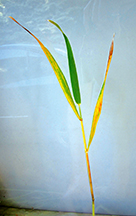April 6, 2016
Hard freeze poses risk to crops, Purdue specialists say
 |
|
This photo shows freeze injury to the lower stem of a wheat plant. Note the bend in the stem due to collapsing tissue. (Purdue Agronomy photo/Shaun Casteel) |
WEST LAFAYETTE, Ind. - Unseasonably cold weather is likely to persist across much of Indiana over the next several days, posing the risk of freeze damage to wheat, forage and fruit crops.
Freeze warnings were posted for the southern and central parts of the state Monday night (April 4), with temperatures falling into the mid-20s Fahrenheit in some areas. After a modest warmup during the middle part of the week, temperatures were expected to plunge again Thursday night through Saturday before recovering to seasonal norms on Sunday.
Producers should be ready for the possibility of low overnight temperatures through the next several weeks, according to the State Climate Office based at Purdue University.
The cold snap comes just as much of the state's winter wheat crop has "greened up" and is starting to joint, said Shaun Casteel, Purdue Extension wheat specialist.
"A lot of areas have been greening up," Casteel said. "Plants from tillering stage to Feekes 5, can withstand quite cold temperatures in the 12-15 degree range without substantial damage to yield."
More mature plants, however, could be at greater risk.
"At the jointing stage, Feekes 6-7, the temperatures that can cause damage are at the 24-degree mark and below," Casteel said. "If you're in that range for more than a couple of hours, the concern is beyond leaf tip burn."
Providing adequate nutrients can help wheat plants cope with the cold, Casteel said.
"Wheat that has been top-dressed with nitrogen and taken it up fare better than those plants with nitrogen deficits," he said. "Adequate nitrogen in the plant is almost like an antifreeze agent."
Casteel said freeze damage might not be apparent for 7-10 days.
"You have to let the plants grow out a little bit before determining what damage has been done," Casteel said. "If you are looking at yellow and brown leaves, that is mostly cosmetic and won't cause significant yield damage at the current growth stages. Under more severe conditions, the growing points die and the lower stems split or bend. That could lead to moderate or severe yield loss.”
Extension forage specialist Keith Johnson advised producers to monitor their alfalfa and cool season grass crops carefully.
"If the weather forecasts are correct and we are looking at the possibility of early morning temperatures in the mid-20s for several days, the next few days could be problematic," he said. "There could certainly be some vegetative burn and a reduction in early season yield."
Johnson said forage crops that were harvested on time last fall would likely be in better shape to handle the cold stress.
"That's why we tell people alfalfa should be harvested no later than Sept. 10," he said. "The plant needs time to build up its energy reserves before winter dormancy."
Many of the state's fruit crops have already started to develop and are more vulnerable to freeze damage, said Peter Hirst, Extension tree fruit specialist.
"In more southern areas of the state, fruit crops have developed more and are at greater risk of cold damage," Hirst said. "Peaches in the southern areas are at or past bloom and we expect to see significant amounts of damage to flowers. But right now there should be enough surviving flowers to still produce a crop."
Apple trees are not as developed as peaches and could survive the cold snap in better shape.
"While there will be some flowers killed by the cold, we are still expecting full apple crops," Hirst said.
Writer: Darrin Pack, 765-494-8415, dpack@purdue.edu
Sources: Shaun Casteel, 765-494-0895, scasteel@purdue.edu
Keith Johnson, 765-494-4800, johnsonk@purdue.edu
Peter Hirst, 765-494-1323, hirst@purdue.edu
Agricultural Communications: (765) 494-2722;
Keith Robinson, robins89@purdue.edu
Agriculture News Page

